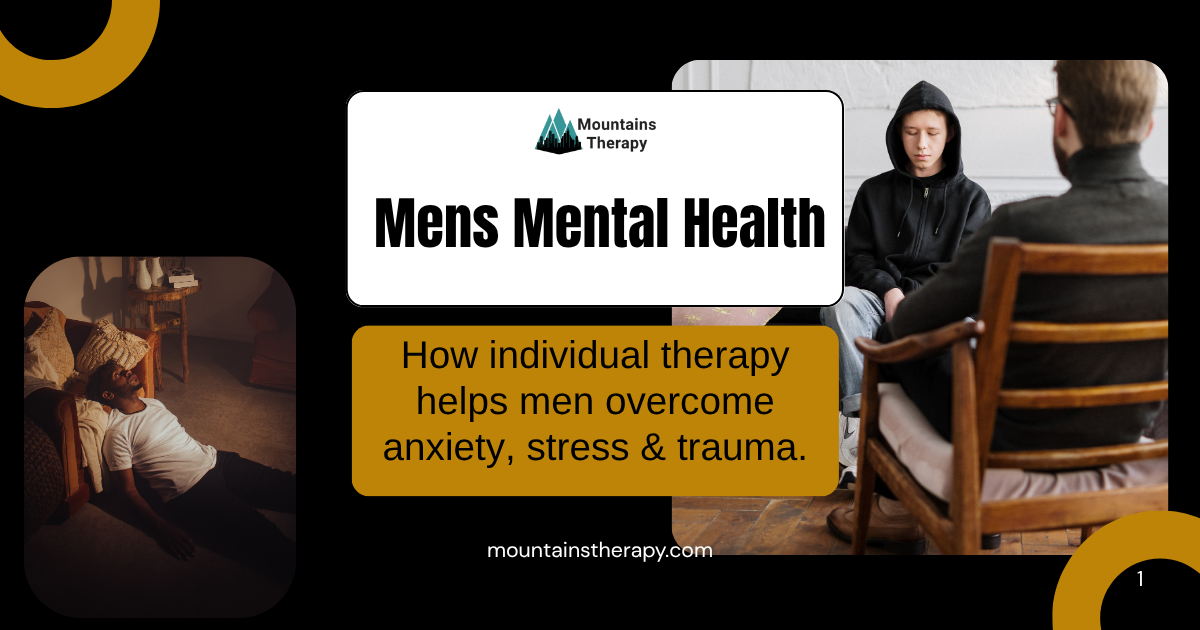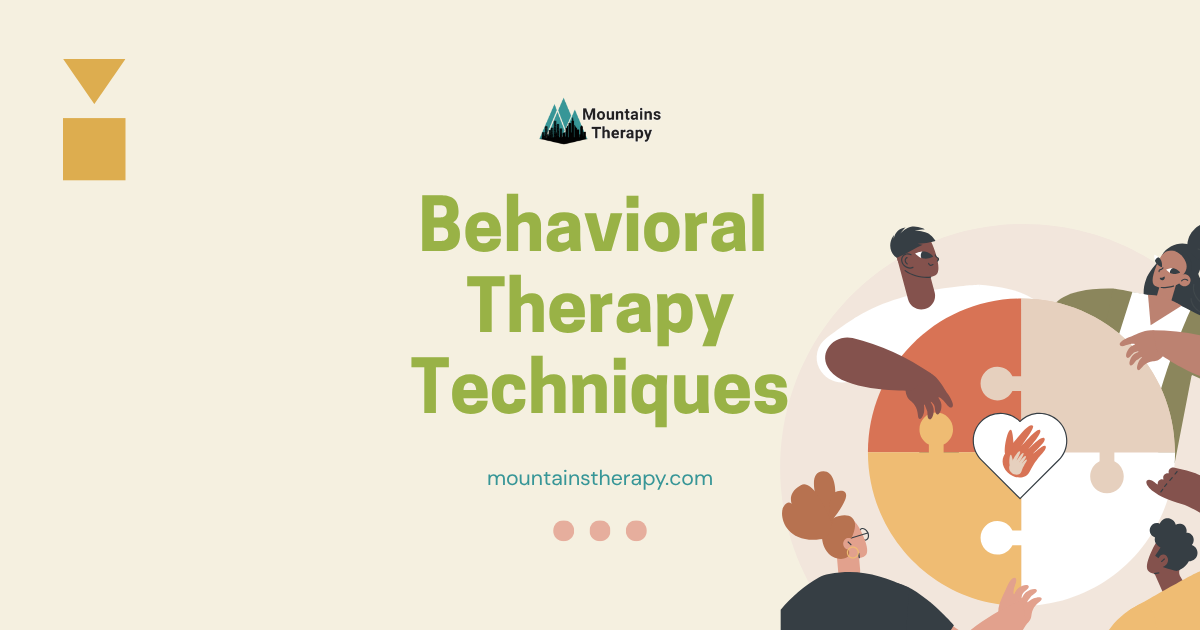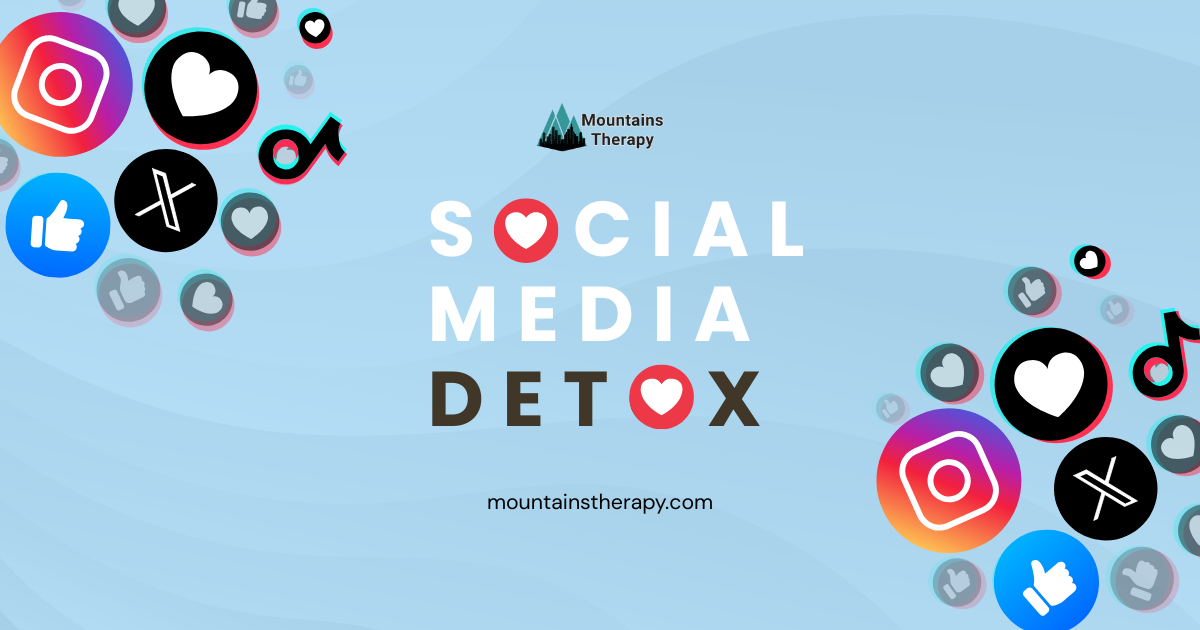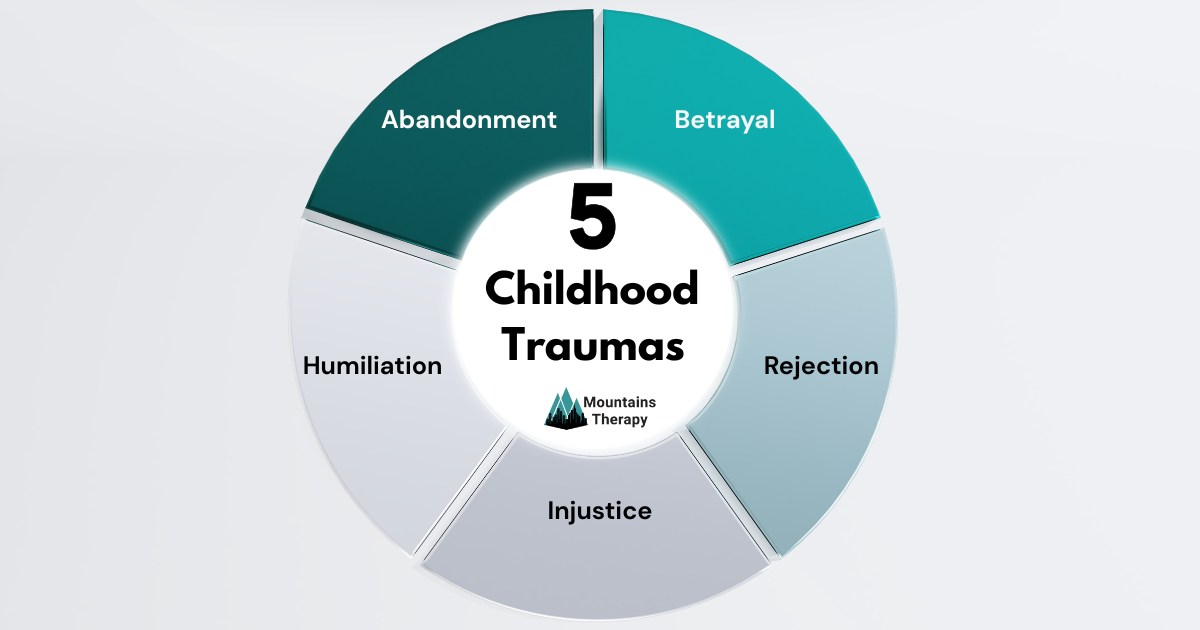Men’s Mental Health Matters: Breaking the Silence and Starting Therapy
Learn more about Individual Therapy for Men.
In This Blog, You’ll Learn:
✅ Why men’s mental health is often overlooked
✅ The stigma around masculinity and emotions
✅ Common mental health issues affecting men
✅ Why men go to therapy and how it helps
✅ What often happens instead of getting help (i.e., what men do instead of therapy)
✅ How Mountains Therapy supports men who need therapy
✅ Evidence-based approaches tailored to men
✅ Answers to frequently asked questions about therapy for men
Why Men’s Mental Health Matters
Men’s mental health is an urgent public health issue. Although awareness of mental health has grown, many men still feel pressure to hide their emotions and avoid seeking help. Cultural messages that equate masculinity with emotional stoicism leave countless men who need therapy suffering in silence.
Ignoring mental health doesn’t make it disappea, it deepens the pain. Untreated issues can lead to substance use, strained relationships, poor physical health, and even suicide. In fact, men are nearly four times more likely to die by suicide than women. It's time to rewrite the narrative. Why men should go to therapy isn’t just a rhetorical questio it’s, a life-saving one. Mental health is strength. Vulnerability is courage. Healing is possible.
Common Signs That Men May Be Struggling
- Anger and Irritability
Outbursts, frustration, or aggression not linked to specific triggers—often masking deeper emotional pain like shame or sadness. May be linked to Anger Management issues. - Withdrawal, Fatigue and Hopelessness
Pulling away from loved ones, hobbies, or social situations; isolating yourself even though you're craving connection. Feeling mentally or physically exhausted, even after rest; experiencing low motivation, cynicism, or apathy. This is common with Depression. - Changes in Sleep or Appetite
Insomnia, oversleeping, overeating, or skipping meals; often accompanied by low energy or poor focus. Can signal both Anxiety & Stress. - Substance Use
Using alcohol, cannabis, or other substances to numb emotions or escape reality. May point to co-occurring issues with trauma or Codependency. - Physical Aches or Tension
Headaches, chest tightness, stomach issues, or muscle pain that stem from prolonged Anxiety or Chronic Illness. - Loss of Interest
Losing excitement in things that used to bring joy, like hobbies, intimacy, or relationships. Often linked to Relationship issues. - Difficulty Concentrating
Trouble focusing at work, making decisions, or remembering things. This could relate to ADHD. - Overworking or Avoidance
Using work, gaming, or screen time to avoid emotional discomfort. This behavior is common in men therapy as a defense mechanism. - Self-Criticism or Shame
Harsh inner dialogue, believing you’re “not good enough,” or feeling like a burden. Often rooted in childhood trauma or unresolved Trauma and PTSD.
These experiences don’t always look like a “breakdown” but they often signal that something deeper is going on. Whether you’re struggling with Anxiety, Depression, Relationship issues, Trauma, or Substance Use, support is available. You don’t have to figure it out alone. Many men in therapy feel relief just by starting the conversation.
Myths vs. Facts About Men’s Mental Health
Myth:
Men will literally therapy only as a last resort.
Fact: Men benefit greatly from early intervention and regular support through therapy.
Myth:
Men will literally before therapy do anything but seek help—like working excessively or isolating.
Fact: Avoidance makes the problem worse. Starting therapy is a proactive move.
Myth:
Can men go to therapy if they don’t know what to say?
Fact: Yes. You don’t need to have the “right” words—just the willingness to start.
Barriers That Keep Men from Seeking Help
- Stigma and Shame: Cultural ideals often push men to suppress emotions, making them wonder why men need therapy at all.
- Cultural Conditioning: Many are taught from boyhood that strength means silence.
- Lack of Emotional Vocabulary: Not knowing how to describe what you feel can lead to emotional shutdown.
- Fear of Vulnerability: A deep fear of being perceived as weak can prevent emotional openness.
- Avoidance Behaviors: It’s common to see what men do instead of therapy—such as overworking, excessive drinking, or reckless behavior.
Coping Strategies for Men’s Mental Health
- Talk It Out: Connection is key. Open up to a friend or a professional.
- Move Your Body: Physical activity is proven to support mental health.
- Limit Substances: Alcohol and drugs numb pain but don’t solve problems.
- Practice Mindfulness: Start small with daily breathwork or quiet reflection.
- Create Routine: Stability in your day can support mood and energy.
- Educate Yourself: Wondering what is hormone therapy men explore as part of their mental health care? It’s often used to support issues like low testosterone, which can affect mood and energy.
How Therapy Helps Men Break the Silence
Can men go to therapy? Yes—and they should. At Mountains Therapy, we meet men where they are, without judgment or assumptions. Whether you're unsure how to talk about your emotions or wondering why men go to therapy, we help you find clarity and direction.
Through Individual Therapy, you can:
Through Individual Therapy, You Can:
- Build emotional awareness and learn how to name, express, and manage your emotions
- Work through anxiety, panic attacks, and chronic worry that interfere with daily life
- Process trauma or painful past experiences that continue to affect your present
- Explore and manage anger in healthier, more constructive ways
- Develop stronger, more secure relationships by improving communication and setting boundaries
- Address burnout, compassion fatigue, and chronic work-related stress
- Reconnect with your identity outside of traditional gender roles or external expectations
- Challenge perfectionism, self-doubt, and fear of failure
- Navigate major life transitions like divorce, fatherhood, career change, or loss
- Improve focus, follow-through, and emotional regulation if you're living with ADHD
- Build resilience and self-trust after experiencing betrayal, heartbreak, or abandonment
- Reduce social anxiety and feel more confident in professional and personal settings
- Create a more meaningful, values-driven life by setting goals that reflect what really matters to you
Therapy Approaches We Use for Men’s Mental Health
At Mountains Therapy NJ, our therapists are trained in evidence-based approaches tailored to the unique needs of men:
- CBT – Cognitive Behavioral Therapy: Helps identify and reframe negative thought patterns.
- Example:
A man constantly thinks, “I’m a failure if I can’t provide financially for my family.” CBT helps him recognize that this belief is extreme and untrue. Together with his therapist, he reframes it to: “I’m doing my best, and my worth is not solely based on income.” This shift reduces shame and opens space for healthier self-esteem.
- DBT – Dialectical Behavioral Therapy: Supports emotional regulation and distress tolerance.
- Example:
A man has intense anger outbursts that damage his relationships. DBT teaches him to recognize emotional triggers, use grounding skills like deep breathing or cold-water exposure, and respond with calm assertiveness instead of aggression.
- ACT – Acceptance and Commitment Therapy: Encourages living in alignment with values despite emotional discomfort.
- Example:
A man feels deep anxiety about being vulnerable in a romantic relationship. ACT helps him accept his discomfort, while also committing to his value of honesty and intimacy. Instead of avoiding closeness, he learns to show up in the relationship despite his fears.
- Mindfulness-Based Therapy: Builds present-moment awareness to reduce stress and reactivity.
- Example:
A man struggles with racing thoughts and constant stress at work. Mindfulness practices help him stay present, notice his breath, and pause before reacting. Over time, he becomes less reactive and more grounded under pressure.
- Psychodynamic Therapy: Explores unconscious patterns rooted in early experiences.
- Example:
A man avoids confrontation in every area of life. Through psychodynamic therapy, he uncovers a childhood pattern where expressing disagreement led to punishment. Recognizing this, he begins to safely challenge and replace old behaviors that no longer serve him.
- SFT – Solution Focused Therapy: Helps men quickly identify goals and solutions.
- Example:
A man feels stuck in his career but doesn’t know where to start. SFT helps him clarify his goal (“I want to feel excited about work again”) and identify one small, immediate step (“Update my resume this week”). This focus on solutions empowers him to take quick, meaningful action.
FAQs About Men’s Mental Health
Q: Why do some men avoid therapy?
A: Societal stigma and fear of vulnerability play a large role. But increasingly, men will before therapy try unhealthy coping skills that mask deeper issues.
Q: What are common reasons why men should go to therapy?
A: Relationship struggles, anger, job stress, past trauma, and emotional numbness are common.
Q: What is hormone therapy men sometimes use alongside mental health support?
A: Hormone therapy may be prescribed when low testosterone contributes to mood disorders, though it should be part of a comprehensive treatment plan.
Take the First Step
Can men go to therapy? Yes, and the more we normalize this, the more healing becomes possible. Whether you’ve been holding things in for years or are just starting to feel overwhelmed, now is the time to prioritize yourself. We offer confidential online therapy for men across New Jersey, North Carolina, Florida, and Utah, and we are currently accepting new clients. Let’s work together to redefine strength, starting with your mental health.











